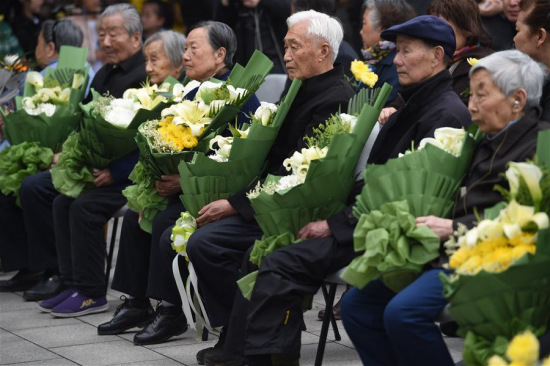
Survivors of Nanjing Massacre attend a ceremony to mourn the Nanjing Massacre victims at the Memorial Hall of the Victims in Nanjing Massacre by Japanese Invaders on the Qingming Festival in Nanjing, capital of east China's Jiangsu Province, April 4, 2016. (Photo: Xinhua/Han Yuqing)
Millions of Chinese people went out for tomb-sweeping following an age-old tradition to mourn their deceased relatives on the Qingming Festival, which falls on Monday this year.
On Qingming, or Tomb-sweeping Day, over 5.4 million people paid visits to the 150 burial sites nationwide monitored by the Ministry of Civil Affairs (MCA), according to the ministry figures.
During the three-day Tomb-sweeping holiday, which ended on Monday, more than 13 million people visited the cemeteries.
The ministry added that the total number of people visiting the burial sites this year increased by 3.7 percent compared to the same period of last year.
Meanwhile, activities to honor war victims and martyrs were also held across the country on Monday.
In Nanjing's Memorial Hall of the Victims in Nanjing Massacre by Japanese Invaders, about 50 massacre survivors and relatives of the deceased mourned in front of the wailing wall, a monument engraved with 10,505 names of the victims.
"Memories of the deceased loved ones are easily back on the special day and I pray for no more wars in the future," Xiang Yuansong, an 88-year-old Nanjing Massacre survivor said in front of the wailing wall, on which his brother and uncle's names were engraved.
The wailing wall was the only place where the massacre victims could be mourned since most of them did not have tombs or remains, said Zhang Jianjun, curator of the memorial hall.
"We are mourning them to remind people to never let the tragedy happen again," he added.
Qingming falls around April 5 each year. The Chinese traditionally honor their ancestors by sweeping their tombs on the day, and the government made the day a public holiday in 2008 to preserve the tradition.
Some modern and more eco-friendly ways for honoring the deceased and burial have emerged in recent year, such as "sweeping tombs" on the Internet and sea-burial, according to the MCA.
Apart from tomb-sweeping, many Chinese also take advantage of the holiday to make sightseeing travels as warm spring encourages outdoor activities.
More than 11.6 million trips were made on the first day of the three-day holiday, according to the China Railway Corporation. The railway authorities expected train trips in the country to hit 41.08 million during the holiday travel rush.


















































